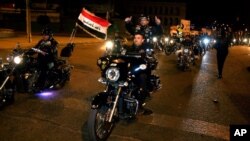Baghdad's decade-old curfew has ended, just hours after a series of bombs killed at least 37 people and wounded scores of others.
The curfew came to an end at midnight, allowing citizens on the streets in the early hours of Sunday. The nighttime curfew had been put in place in the capital in an attempt to reduce violence and kidnappings.
''Now we are free, we can go out after midnight. We can drive our cars freely to enjoy a vibrant night life away from the congestion during the day,'' said Ali Saad, a local resident.
In one of Saturday's attacks, a suicide bomber set off explosives on a busy street near a restaurant, killing at least 22 people and wounding many others.
"The restaurant was full of young people, children and women when the suicide bomber blew himself up, many got killed," said Mohamed Saeed, an eyewitness.
In another development Saturday, Iraqi Prime Minister Haider al-Abadi met with U.S. Vice President Joe Biden and Secretary of State John Kerry in Munich where U.S. officials say they discussed efforts to fight the Islamic State and talked about the importance of a "whole-of-government" approach to provide sound local governance, reconstruction and economic opportunity in areas liberated from the group.
Meanwhile, the remains of at least 16 members of the Yazidi religious minority were found in a mass grave in northern Iraq.
Yazidis are ethnic Kurds whose ancient, monotheistic religion has links to Zoroastrianism.
Yazidis have suffered repeated bouts of discrimination over the centuries, in particular by Arab Muslims who misunderstand their faith.
Some material for this report came from AP, AFP and Reuters.





